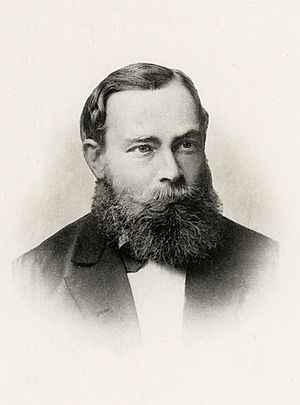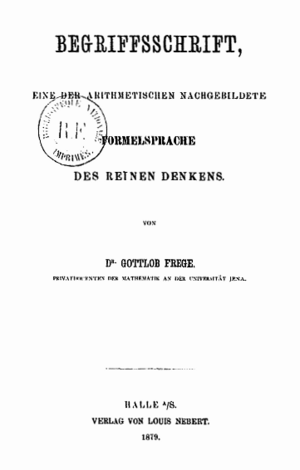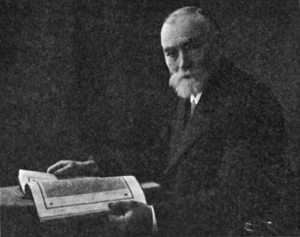Gottlob Frege facts for kids
Quick facts for kids
Gottlob Frege
|
|
|---|---|

Frege in c. 1879
|
|
| Born | 8 November 1848 Wismar, Grand Duchy of Mecklenburg-Schwerin, German Confederation
|
| Died | 26 July 1925 (aged 76) Bad Kleinen, Free State of Mecklenburg-Schwerin, German Reich
|
| Education | University of Göttingen (PhD, 1873) University of Jena (Dr. phil. hab., 1874) |
|
Notable work
|
Begriffsschrift (1879) The Foundations of Arithmetic (1884) Basic Laws of Arithmetic (1893–1903) |
| Era | 19th-century philosophy 20th-century philosophy |
| Region | Western philosophy |
| School | Analytic philosophy Linguistic turn Logical objectivism Modern Platonism Logicism Transcendental idealism (before 1891) Metaphysical realism (after 1891) Foundationalism Indirect realism< Redundancy theory of truth |
| Institutions | University of Jena |
| Theses |
|
| Doctoral advisor | Ernst Christian Julius Schering (PhD thesis advisor) |
| Other academic advisors | Rudolf Friedrich Alfred Clebsch |
| Notable students | Rudolf Carnap |
|
Main interests
|
Philosophy of mathematics, mathematical logic, philosophy of language |
|
Notable ideas
|
Anti-psychologism
principle of compositionality context principle quantification theory predicate calculus Frege's propositional calculus ancestral relation logicism sense and reference Frege's puzzles concept and object sortal Third Realm mediated reference theory (Frege–Russell view) descriptivist theory of names redundancy theory of truth, set-theoretic definition of natural numbers Hume's principle Basic Law V Frege's theorem Frege–Church ontology Frege–Geach problem law of trichotomy technique for binding arguments, round square copula |
|
Influences
|
|
|
Influenced
|
|
Gottlob Frege (born November 8, 1848 – died July 26, 1925) was a German philosopher, logician, and mathematician. He taught mathematics at the University of Jena. Many people see him as the founder of analytic philosophy. This is a way of thinking that focuses on language, logic, and mathematics.
Even though he wasn't well-known during his life, his ideas became very important later. Thinkers like Giuseppe Peano, Bertrand Russell, and Ludwig Wittgenstein helped share his work. Frege is often called the greatest logician since Aristotle. He is also considered one of the most important philosophers of mathematics ever.
Frege's work helped create modern logic. He also explored the basic ideas of mathematics. His book The Foundations of Arithmetic is a key text for the idea that mathematics comes from logic. His papers "On Sense and Reference" and "The Thought" are also very famous. In these works, he discussed different types of meaning and how names refer to things.
Contents
Frege's Life Story
Early Years (1848–1869)
Gottlob Frege was born in 1848 in Wismar, Germany. His father, Carl Alexander Frege, was a headmaster at a girls' high school. After his father passed away, his mother, Auguste Frege, took over the school.
As a child, Frege was exposed to ideas that would shape his future. For example, his father wrote a textbook for children. This book talked about the structure and logic of language.
Frege finished school in 1869. His teacher, Gustav Adolf Leo Sachse, encouraged him to study at the University of Jena. This was a very important step for Frege's career.
University Studies (1869–1874)
Frege started at the University of Jena in 1869. He took many classes, mostly in mathematics and physics. His most important teacher was Ernst Abbe, a physicist and mathematician. Abbe was a mentor and friend to Frege. He later helped Frege in his career.
Frege also studied at the University of Göttingen starting in 1871. This was a top university for mathematics in Germany. In 1873, Frege earned his PhD there. His paper was about how to show imaginary shapes in geometry.
In 1887, Frege married Margarete Katharina Sophia Anna Lieseberg.
Frege's Work in Logic
Frege first studied geometry, but his work soon shifted to logic. His book Begriffsschrift (which means "concept-script") changed how people thought about logic. It introduced new ways to understand functions and variables.
Frege wanted to show that mathematics is based on logic. To do this, he created new methods that were different from older logic systems. He invented predicate logic, which uses "quantified variables." These variables helped solve the "problem of multiple generality." This problem made it hard to express complex ideas like "every boy loves some girl who loves some boy." Frege's new system could easily show these different meanings.
For example, older logic couldn't easily represent mathematical statements like Euclid's theorem. This theorem says there are endless prime numbers. Frege's "conceptual notation" could handle such ideas. His work laid the groundwork for many important ideas in modern logic and mathematics. These include Bertrand Russell's Principia Mathematica and Kurt Gödel's incompleteness theorems.
Frege wanted to find the true logical rules for reasoning. He believed that mathematical proofs should be purely logical. They should not rely on "intuition" or guesswork. His main goal was to prove that arithmetic is a part of logic. He thought arithmetic didn't need non-logical rules.
He wrote about this idea in The Foundations of Arithmetic (1884). Later, in Basic Laws of Arithmetic (1893–1903), he tried to show how all arithmetic rules could come from logical principles.
However, a problem arose. In 1903, Bertrand Russell found a contradiction in Frege's system. This problem is now called Russell's paradox. It showed that one of Frege's main rules, called Basic Law V, led to a contradiction. Frege added a note to his book, explaining the problem. He tried to fix it, but his solution didn't work perfectly.
Despite this setback, Frege's ideas were very important. His work helped shape second-order logic. Later, other philosophers like George Boolos found ways to fix the issues in Frege's system. One important idea is Hume's principle. It says that two groups have the same number of items if they can be matched up one-to-one. This principle, along with Frege's other ideas, can be used to prove the rules of arithmetic. This is known as Frege's theorem.
Frege's logical ideas spread through the work of his students and admirers. These included Rudolf Carnap, Bertrand Russell, and Ludwig Wittgenstein.
Frege as a Philosopher
Frege is seen as one of the founders of analytic philosophy. His ideas about logic and language led to the "linguistic turn" in philosophy. This means that philosophers started to focus more on how language works.
His contributions to the philosophy of language include:
- Analyzing sentences like functions and arguments.
- Explaining the difference between a concept (an idea) and an object (a thing).
- The principle of compositionality: meaning that the meaning of a sentence comes from the meaning of its parts.
- The context principle: words only have meaning in the context of a sentence.
- The difference between the sense (the way something is presented) and the reference (what it points to) of words.
As a philosopher of mathematics, Frege argued against psychologism. This idea said that mathematical ideas come from how our minds work. Frege believed that numbers and ideas exist independently of our minds. He wanted to answer questions like "What is a number?" and "What do number-words refer to?" In doing so, he explored the nature of meaning itself. His conclusions greatly influenced later analytic philosophy.
Personality and Impact
Frege's students described him as a very private person. He rarely talked much during lectures and often faced the blackboard. However, he was known to be witty and sometimes sarcastic in class.
Frege's published writings were very technical. They didn't often discuss everyday issues. His personal diary, published after his death, showed that his political views became more extreme later in life. He expressed strong opinions against certain groups and political systems. However, he never spoke about these views in public. He also had friendly relationships with Jewish students, like Gershom Scholem.
Important Dates
- 1848: Born on November 8 in Wismar, Germany.
- 1869: Attends the University of Jena.
- 1871: Attends the University of Göttingen.
- 1873: Earns his PhD in mathematics (geometry) from Göttingen.
- 1874: Becomes a private teacher at Jena.
- 1879: Becomes an associate professor at Jena.
- 1896: Becomes an honorary full professor at Jena.
- 1918: Retires from his teaching position.
- 1925: Dies on July 26 in Bad Kleinen, Germany.
Important Works
Logic and Foundations of Arithmetic
- Begriffsschrift: a formula language, modeled upon that of arithmetic, for pure thought (1879). This book introduced his new system of logic.
- The Foundations of Arithmetic: A Logico-Mathematical Enquiry into the Concept of Number (1884). In this book, he explored the basic ideas of numbers.
- Basic Laws of Arithmetic, Volume I (1893) and Volume II (1903). Here, he tried to show how all arithmetic could be derived from logic.
Philosophical Studies
- "Function and Concept" (1891)
- "On Sense and Reference" (1892). This paper discusses how words have both a "sense" and a "reference."
- "Concept and Object" (1892)
- "What is a Function?" (1904)
- Logical Investigations (1918–1923). This collection includes:
- "The Thought: A Logical Inquiry"
- "Negation"
- "Compound Thought"
See also
 In Spanish: Gottlob Frege para niños
In Spanish: Gottlob Frege para niños
- Frege system
- List of pioneers in computer science
- Neo-Fregeanism
 | Sharif Bey |
 | Hale Woodruff |
 | Richmond Barthé |
 | Purvis Young |



